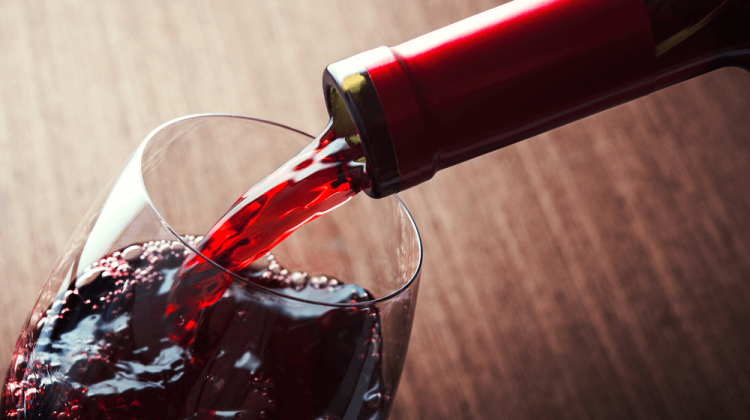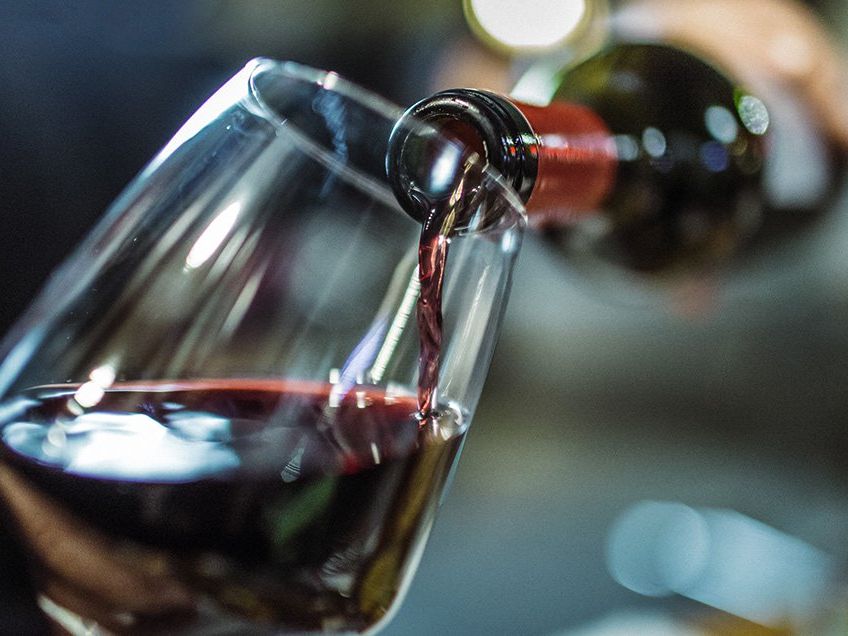
Drinking a bottle of wine can be a pleasurable experience for many, but it’s essential to understand the physiological consequences it has on the human body.
Wine, like all alcoholic beverages, contains ethanol, a psychoactive compound that affects various bodily systems. As you savor that glass of wine, your body undergoes a series of changes.

Upon consumption, alcohol rapidly enters the bloodstream through the stomach and small intestine, causing immediate effects on the central nervous system.
Your inhibitions may diminish, and your mood may lighten. However, as the night progresses, so do the effects. Alcohol acts as a depressant, slowing down your brain’s activity, coordination, and reflexes. This can impair judgment and increase the risk of accidents.
The liver plays a critical role in metabolizing alcohol, working tirelessly to break it down and eliminate it from your body. Excessive alcohol intake, such as a bottle of wine, can strain the liver, potentially leading to long-term health issues.
Additionally, alcohol can dehydrate you, disrupt sleep patterns, and even affect your heart rate and blood pressure.
In this exploration of what happens to your body when you drink a bottle of wine, we will delve deeper into these effects, shedding light on the intricate interplay between alcohol and the human physiology.
What happens if you drink 1 bottle of wine?
1. You may have a terrible night of sleep.
Consuming a bottle of wine before bedtime can seriously disrupt your sleep patterns. While alcohol may initially make you drowsy, it negatively impacts the quality of sleep.
It reduces rapid eye movement (REM) sleep, leading to fragmented and less restorative slumber. This can result in a night of poor sleep, leaving you feeling fatigued and groggy the next day.
2. You may get a stuffy nose.
Drinking a bottle of wine may lead to a stuffy or congested nose. Alcohol, particularly red wine, contains histamines, compounds that can trigger allergic reactions and cause nasal congestion in some individuals.
Additionally, alcohol can dilate blood vessels, including those in the nasal passages, leading to inflammation and a stuffy nose.
This can make breathing more challenging, especially for those already prone to allergies or sinus issues, adding another potential discomfort to the list of effects of excessive wine consumption.

3. Your blood pressure and heart rate will jump.
Drinking a bottle of wine can lead to a temporary increase in both blood pressure and heart rate. Alcohol dilates blood vessels, causing the heart to pump blood more vigorously to maintain circulation.
This can result in elevated blood pressure. Additionally, alcohol can stimulate the release of stress hormones, further elevating heart rate.
These fluctuations in cardiovascular function can be especially concerning for individuals with pre-existing heart conditions and may contribute to health risks over time.
4. It’ll get a lot of liquid calories and a shot of sugar.
When you consume a bottle of wine, you’re taking in a significant number of liquid calories along with a shot of sugar. Wine contains both alcohol and residual sugars from the fermentation process.
These calories can add up quickly, contributing to weight gain if not offset by reduced calorie intake or increased physical activity.
Being mindful of these hidden liquid calories is essential for those watching their calorie intake or managing their sugar intake for health reasons.
5. Your brain will get too much GABA.
When you consume a bottle of wine, your brain experiences an increase in gamma-aminobutyric acid (GABA), a neurotransmitter that inhibits brain activity.
This surge in GABA leads to a sedative effect, causing drowsiness and impairing cognitive function.
While it may initially induce relaxation, excessive GABA can contribute to sluggishness and poor coordination, highlighting one of the effects of alcohol on the central nervous system.
Recommended: How To Make Kunu Zaki Drink In Less Time
6. You’ll become legally intoxicated.
Consuming a bottle of wine will almost certainly result in legal intoxication.
The alcohol content in a typical bottle of wine is substantial enough to push most individuals well above the legal blood alcohol concentration (BAC) limit for driving in many countries.
Being legally intoxicated means impaired cognitive and motor function, posing significant risks to yourself and others.
It’s crucial to avoid driving or engaging in any activity requiring focus and coordination after drinking a bottle of wine.

7. You may get a stuffy nose.
Drinking a bottle of wine may lead to a stuffy or congested nose. Alcohol, particularly red wine, contains histamines, compounds that can trigger allergic reactions and cause nasal congestion in some individuals.
Additionally, alcohol can dilate blood vessels, including those in the nasal passages, leading to inflammation and a stuffy nose.
This can make breathing more challenging, especially for those already prone to allergies or sinus issues, adding another potential discomfort to the list of effects of excessive wine consumption.
Recommended:
Top 12 Lowest Calorie Drinks at Dutch Bros (2023)
8. It’ll make you want to order takeout
Indulging in a bottle of wine can influence your food cravings and decision-making.
Alcohol lowers inhibitions and impairs judgment, often leading to increased appetite and cravings for high-calorie, indulgent foods.
This can tempt you to order takeout or make less-than-healthy food choices while under the influence. It’s important to be mindful of these effects and make responsible decisions regarding food consumption while drinking wine.
9. Your blood sugar might lower
Drinking a bottle of wine can lead to a drop in blood sugar levels. Alcohol interferes with the liver’s ability to release stored glucose into the bloodstream, which can result in hypoglycemia or low blood sugar.
This can lead to symptoms like weakness, dizziness, and shakiness.
It’s important to be cautious, especially if you have diabetes, as excessive alcohol consumption can further exacerbate blood sugar fluctuations and potentially lead to serious health complications.
10. Your body will put the brakes on fat burning
When you consume a bottle of wine, your body prioritizes metabolizing alcohol over burning fat.
Alcohol is processed as a toxin, and your liver focuses on breaking it down. During this process, your body essentially puts the brakes on fat burning.
The result is that the excess calories from the wine can be stored as fat, potentially contributing to weight gain if this becomes a regular occurrence in your drinking habits.
Read also: Top 33 Keto Starbucks drinks and orders in 2023
11. You’ll lose coordination, reaction time, and maybe miss that car horn.
Consuming a bottle of wine impairs coordination and reaction time, posing potential risks when operating a vehicle.
Alcohol’s depressant effect on the central nervous system slows down neural responses, leading to decreased motor skills and delayed reactions.
This diminished ability to respond quickly can compromise your safety and that of others on the road.
A bottle of wine can significantly impair your judgment, making it easier to miss critical cues like a car horn or changes in traffic conditions, increasing the likelihood of accidents.
Frequently Asked Questions
What are the side effects of drinking a bottle of wine?
- Intoxication: Consuming a bottle of wine typically results in legal intoxication, impairing judgment, coordination, and reaction time.
- Dehydration: Alcohol is a diuretic, leading to increased urination and potential dehydration, which can cause headaches and other discomforts.
- Digestive Issues: Wine can irritate the stomach lining, leading to gastritis and possibly causing diarrhea or gastrointestinal discomfort.
- Weight Gain: Wine contains calories, and excessive consumption can lead to weight gain over time if not offset by reduced calorie intake or exercise.
- Liver Strain: Regular excessive wine consumption can strain the liver, potentially leading to long-term health issues like liver disease.
Read also: 15 drinks that melt belly fat ,Says dietitian.
Is it bad to drink a whole bottle of wine?
Yes, drinking a whole bottle of wine in one sitting is generally not advisable. It can lead to intoxication, impair judgment, and pose health risks.
Additionally, it can result in a high calorie and sugar intake, potentially contributing to weight gain and other health issues over time. Moderation in alcohol consumption is essential for overall well-being.
Will 1 bottle of wine get me drunk?
Yes, consuming one bottle of wine, which typically contains about 5-6 glasses of wine, is likely to lead to a state of intoxication for most individuals.
The level of intoxication can vary depending on factors such as your body weight, tolerance, and the alcohol content of the wine.
Drinking an entire bottle of wine in one sitting can be harmful. It often leads to intoxication, impaired judgment, and potential health risks like dehydration and liver strain. Moderation in alcohol consumption is important for well-being.
Consuming a whole bottle of wine in one night is likely to result in a severe hangover the next day.
Hangover symptoms can include headaches, nausea, dehydration, fatigue, and impaired cognitive function.
It’s essential to drink responsibly to avoid the discomfort and health risks associated with excessive alcohol consumption.
Drinking an entire bottle of wine in one sitting can potentially be lethal due to alcohol poisoning, particularly if consumed rapidly. It’s crucial to recognize the dangers of excessive alcohol intake and practice moderation.
Read Also
The Effects of Drinking a Gallon of Water Daily on Your Body
16 Energy Drink and Caffeine Content of Them
Top Starbucks Menu With Price List Philippines 2023
14 Health Benefits of Apple Cider Vinegar
Conclusion
In conclusion, indulging in an entire bottle of wine can have significant and varied effects on the human body.
From the immediate impact of intoxication, impaired coordination, and increased blood pressure to potential long-term consequences like liver strain and weight gain, it’s evident that moderation is key.
Moreover, it’s important to recognize that each individual’s tolerance and susceptibility may differ. Understanding these effects allows us to make informed choices about our alcohol consumption and prioritize our well-being.
Whether for enjoyment or social occasions, responsible and mindful drinking remains the best approach to minimize the potential harm associated with consuming a bottle of wine.
